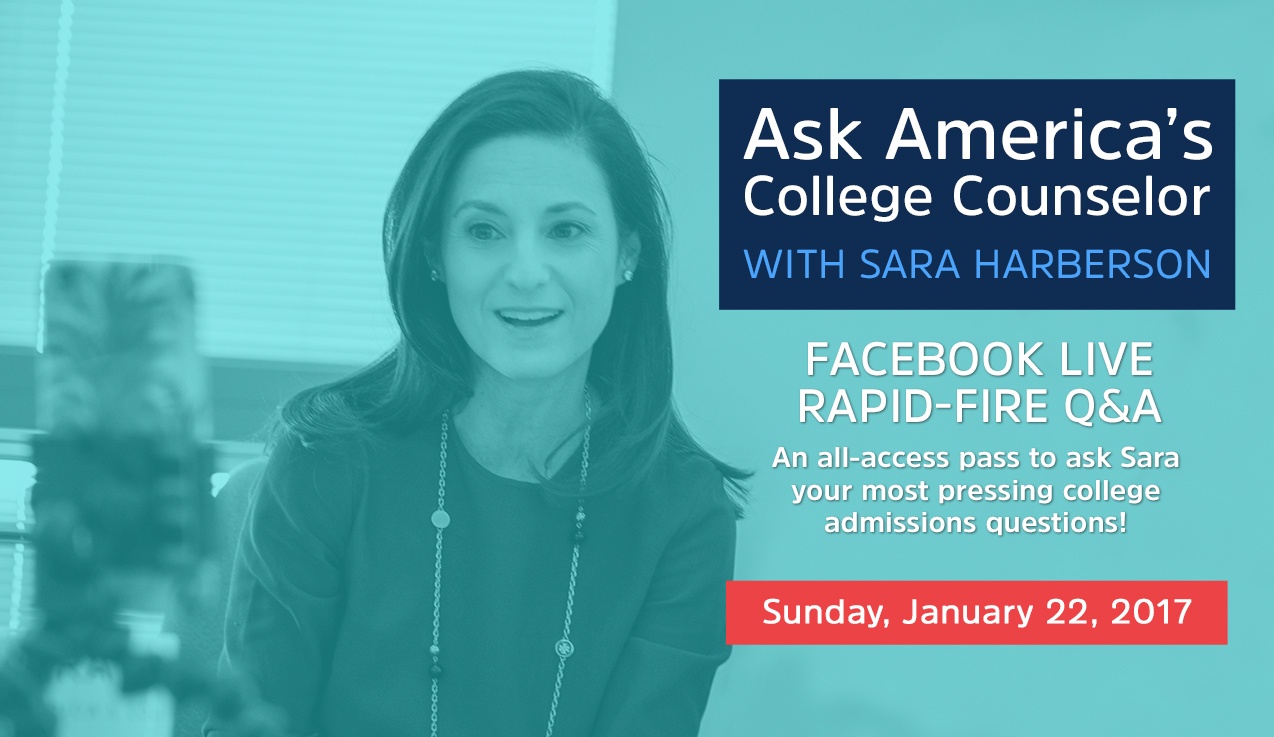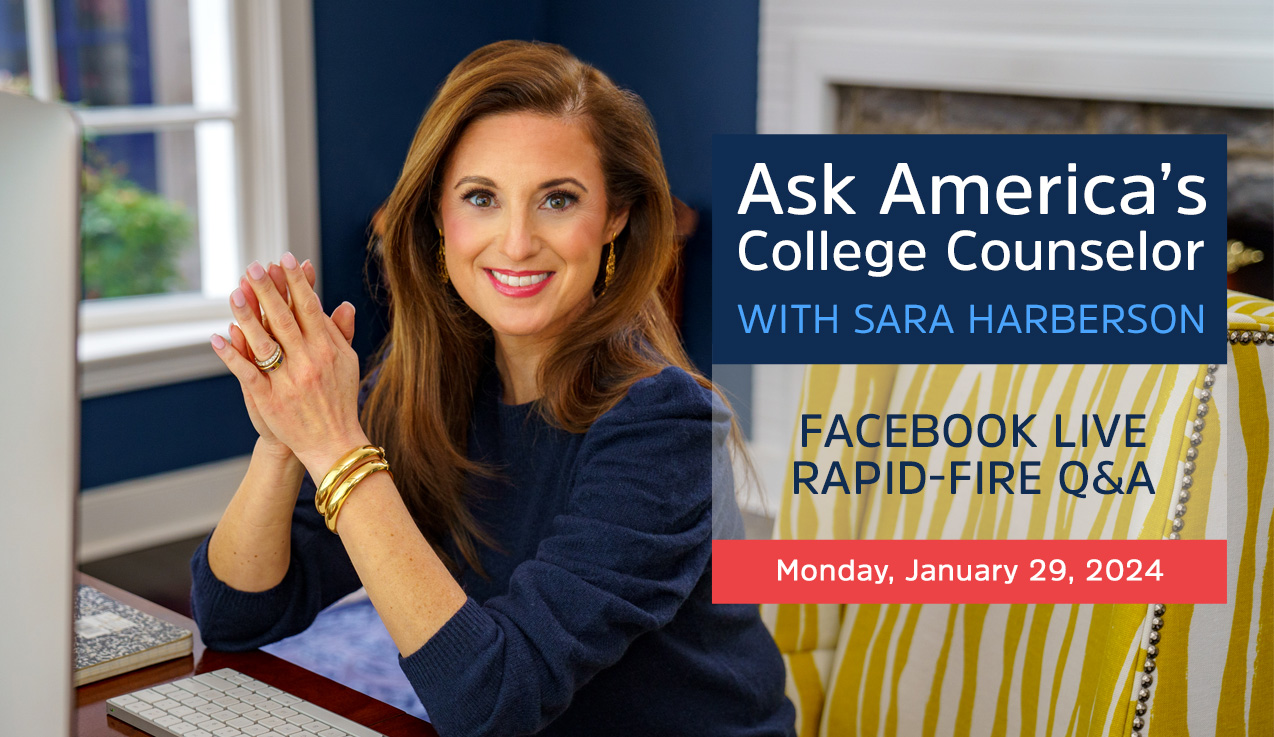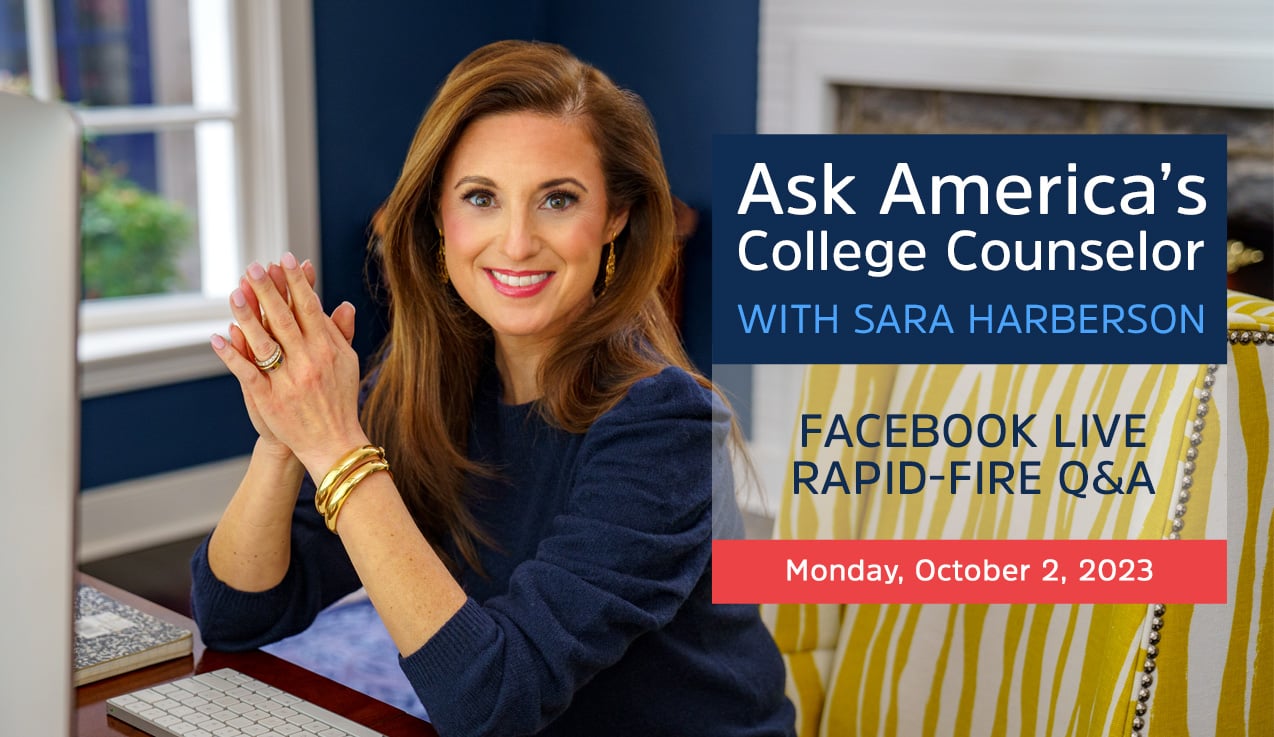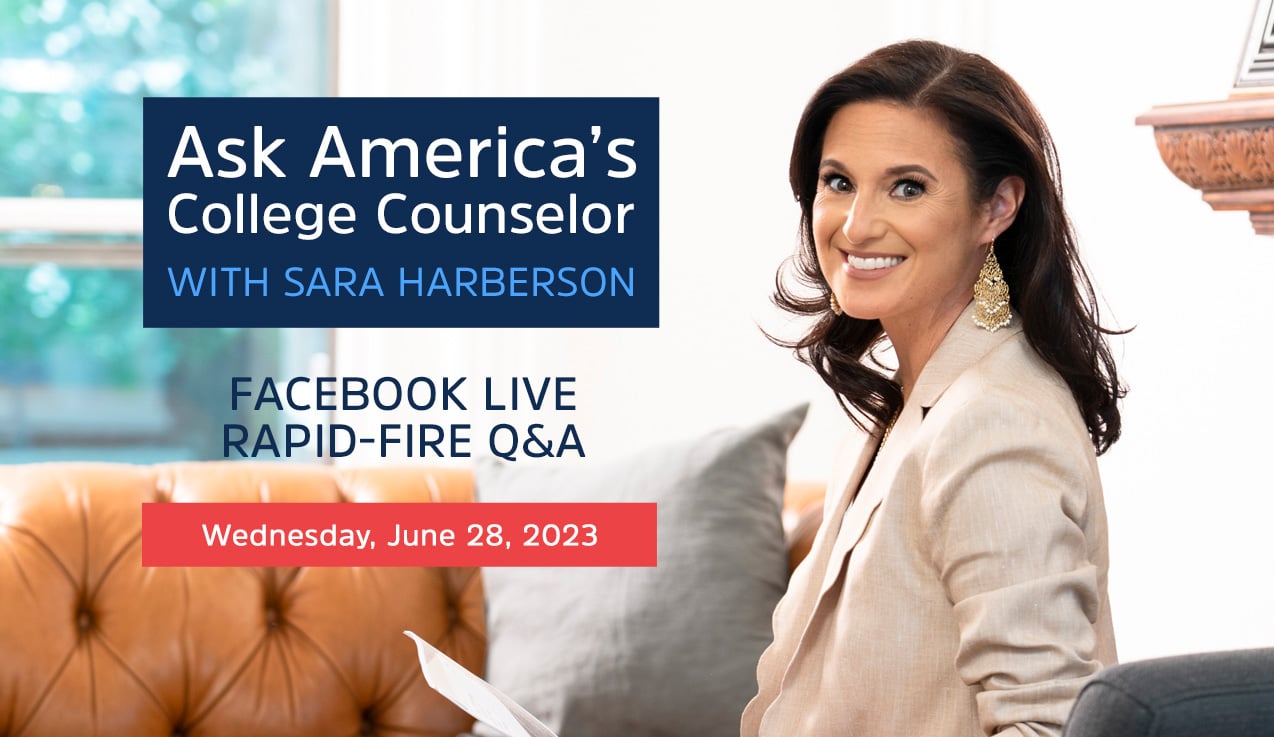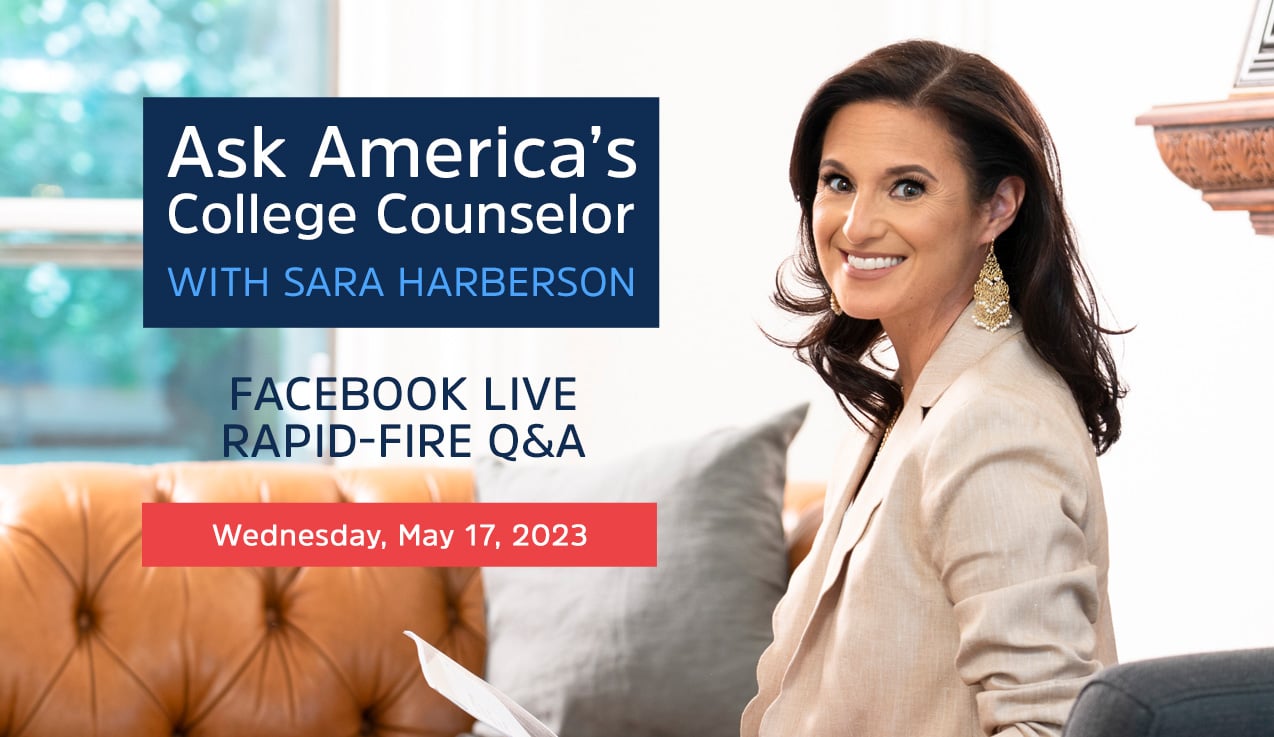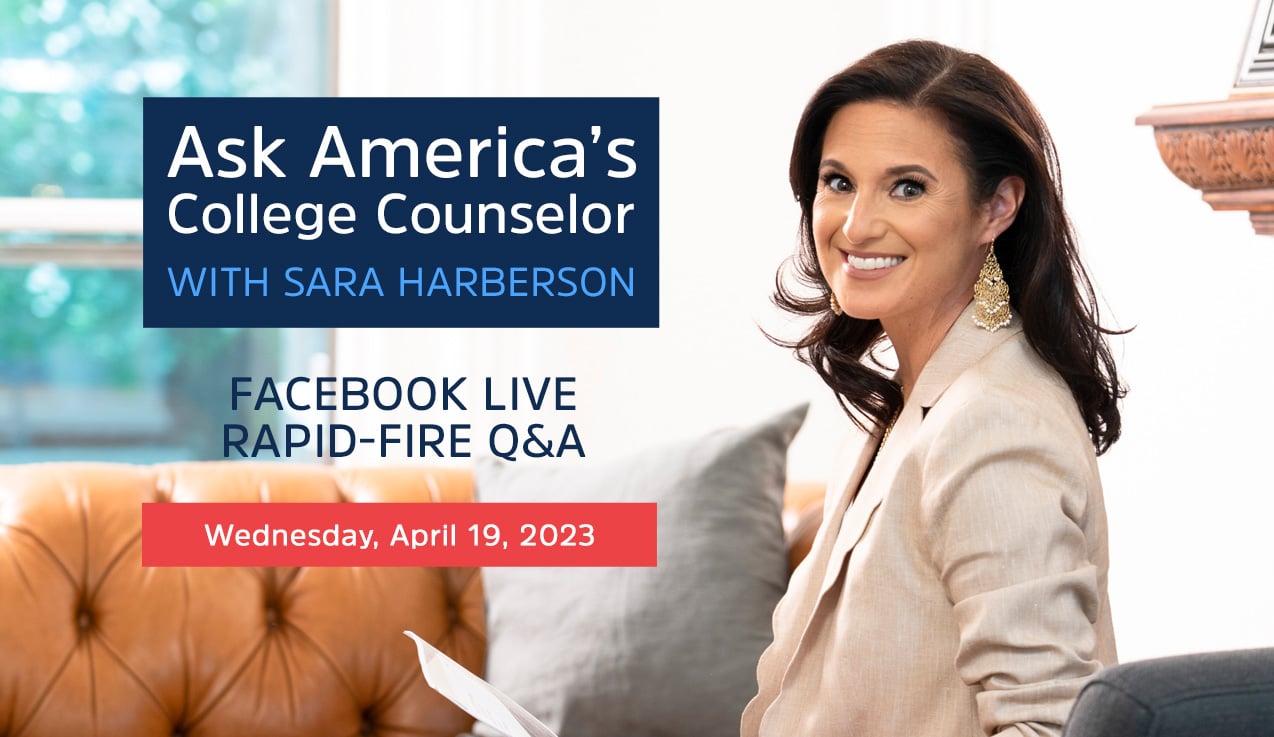In case you missed it, here's a recap of my recent Facebook Live Rapid-Fire Q&A!
I know how overwhelmed many of you are with college admissions questions. Getting into college is a lot of work. (An understatement, right?) I’ve heard from so many students who have desperately Googled their college admissions questions only to find conflicting answers—or worse, bad advice. That's why I decided to launch a new kind of Facebook Live Q&A, a rapid-fire session called Ask America's College Counselor, where I answer questions live from the comments section! If you didn't get to see the first session of Ask America's College Counselor stream live, you can watch the video below. And don't forget to scroll to the end of this post to see my answers to a few bonus questions that I didn't get to during the live broadcast!
QUESTIONS YOU'LL SEE ME ANSWER:
Early Action/Early Decision
- If your child's first college choice isn't an ED or EA, how do you communicate to that school on the application that they are their first choice and will accept?
- What kinds of things should be included in a letter to your Early Decision school after deferment?
Financial Aid
- Are financial aid offers negotiable? If so, what is the best way to do that? Calling, emailing, etc?
- What are some of the general guidelines for being eligible for financial aid?
- Should you apply for financial aid regardless of income?
- What effect, if any, does applying for financial aid have on admission chances?
- Can a merit scholarship that's already been offered be increased if senior mid-year grades are better than cumulative GPA presented on the application? Who should be contacted?
- What do you advise very high academic students that are looking at top colleges (Ivies/Stanford/MIT/etc.) vs. flagships that have offered significant merit aid? Applying to each?
College Applications & Admissions
- Do you have any guidance for GAP programs? A lot of the ones that I see online are as expensive as college.
- If decision day is 20 days away, should my son write a letter to show interest and announce that it would be his first choice and he would attend?
- What are good resources (e.g., books, online sources) for students to create an initial list of colleges to visit?
- How important is leadership on a college application? How do you stand out when you attend a high school with 4,000 students when only so many can "lead"?
- Does having something like being the executive producer of a website or having a reel of on-air experience matter when applying to journalism school?
- My daughter has to graduate early if she wants to study abroad as her high school does not allow students to study abroad. One of the early graduation requirements is admittance to a 4 yr college. She is considering applying to a college she is certain to be admitted knowing she is unlikely to attend and doing her 'real' college applications when she is studying abroad. Do you have advice on the best strategy for my daughter to meet the requirements of her high school while still keeping her college options open?
Courses, Tests, & Extracurriculars
- Is it better to take an AP class and get a B or to take an honors class and get an A? Which would colleges rather see?
- Does it look better on college applications to take college plus classes junior or senior year?
- With an ACT 34 but writing score of 7, should the test be taken again?
- What are good extracurriculars for something in science?
BONUS Q&A- BIG QUESTIONS THAT DIDN'T MAKE THE VIDEO
1. Do you recommend sending a resume in addition to the applications? And if so, do you have a good resource for composing one?
I've never been a big fan of resumes in the college process. Unless a college specifically asks/requires one, I would focus on making sure everything is reflected in the application. Admissions officers are used to reading the application. When they have to read additional materials that aren't using the same template they are used to, they can get annoyed. There are a lot of alumni interviewers who ask for a resume when a student interviews with them, though. If a student has to create one, I recommend a basic template that is straightforward and easy to read.
2. What do admissions departments think of dual enrollment—taking a college class during your junior or senior year?
If dual enrollment is the most rigorous option at the school and AP/IB courses aren't offered, colleges will value it. Dual enrollment can help keep the cost down for college, especially if the student plans to stay in-state for college. But if they're considering out-of-state colleges, they may find that those colleges may not give credit for those courses. Many private or out-of-state colleges are going to want that student to take all eight semesters at their college so that they have a full academic load. If not, they lose money on that student. Also, some of these colleges believe that if the student is getting credit for these dual enrollment courses to graduate from high school, they shouldn't get credit towards their college degree. It's the double-dip rule.
3. If your student is "undecided" on their major when first applying, does that hinder their likelihood to get into a college/university?
It won't hinder a student if they are able to articulate some academic leanings in the application. So, if the college has an additional essay about why the student is applying and what programs interest them, the student can elaborate on some academic interests. They won't be bound to anything, though. Frankly, they're not bound by the specific major they list on the application unless they are applying to a very specific program. However, indicating a specific major and showing evidence to back it up in the application can enhance their chances. Evidence of academic interest can be shown through that essay I mention, extracurricular activities, or additional academic work related to the field.


